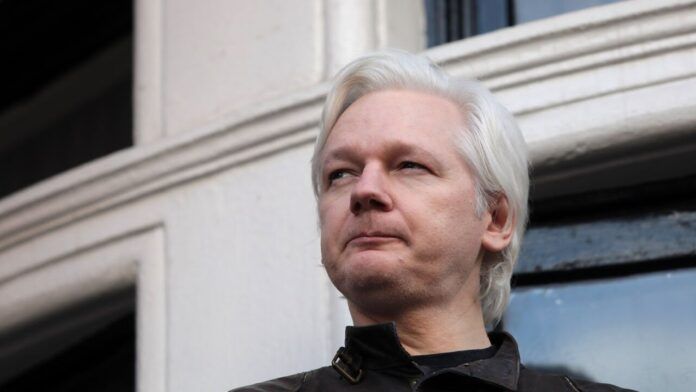High court delays Assange’s extradition decision, seeking US assurances on trial conditions and potential penalties
In a significant development in the prolonged legal battle of WikiLeaks founder Julian Assange against extradition to the United States, the High Court in London has postponed its decision, introducing a new phase of uncertainty and legal wrangling. Assange, who has been at the centre of a contentious international legal saga for over a decade, faces charges in the US that could lead to a sentence of up to 175 years in prison. The charges stem from WikiLeaks’ publication of a vast array of classified documents, which the US alleges endangered lives and national security. This intricate case touches on fundamental issues of freedom of expression, political asylum, and the rights of journalists and whistleblowers in the digital age.
The High Court’s recent judgment has temporarily forestalled Assange’s extradition, contingent on the United States providing specific assurances regarding the conditions under which Assange would be tried and detained. These assurances are pivotal to addressing concerns over potential human rights violations, including inhumane treatment and the risk of an excessively severe sentence. The court’s decision has sparked a flurry of reactions from supporters and critics alike, underlining the case’s significance in debates over press freedom, the limits of state secrecy, and the accountability of governments to public scrutiny.
The Telegraph
The Telegraph’s coverage underscores the ongoing judicial proceedings in the UK’s High Court, where judges Dame Victoria Sharp and Mr Justice Johnson have temporarily halted Julian Assange’s extradition to the United States. The court’s directive for the US to provide certain assurances reflects the complex legal and ethical considerations at play. Assange, accused of conspiring to obtain and disclose national defence information, finds himself at a critical juncture, with his fate hanging in the balance as the US is given a three-week deadline to respond.
The article delves into the specific legal grounds on which Assange’s appeal could proceed, contingent on the US’s compliance with the court’s request for assurances. These include concerns about the fairness of his trial and the conditions of his potential detention in the US. The Telegraph’s report also highlights the emotional response from Assange’s supporters, who see the case as a watershed moment for press freedom and the right to expose governmental misconduct.
Sky News
Sky News emphasizes the High Court’s decision to delay Julian Assange’s extradition, offering a detailed account of the legal arguments and the potential implications for Assange and the broader context of journalistic freedom. The report paints a vivid picture of the legal battle’s stakes, highlighting the charges against Assange and the defence’s arguments regarding the political motivations behind the US’s prosecution efforts.
Sky News provides a comprehensive overview of the case’s history, including previous court rulings and the key issues at stake, such as the risk of suicide Assange might face if extradited. The coverage also touches on the widespread public support for Assange, depicting scenes of demonstrations and the palpable sense of urgency among his advocates. The emotional and political dimensions of the case, as articulated by Assange’s wife Stella, add a personal layer to the legal discourse, underscoring the human rights concerns that have galvanized global attention.
Politico
Politico’s report focuses on Julian Assange’s temporary reprieve in his extradition saga, detailing the High Court’s requirement for the US to provide “satisfactory assurances” regarding the fairness of his trial and the protection of his rights. This coverage brings to light the legal intricacies and diplomatic tensions underlying the extradition debate, offering insights into the potential consequences for Assange and the principle of freedom of expression.
The article outlines the legal backdrop of Assange’s case, including the initial allegations and the subsequent legal challenges he has faced. Politico’s analysis extends to the broader implications of the case, considering its impact on international relations, press freedom, and the legal precedents for extradition cases involving allegations of espionage and the publication of classified information.
The Guardian
The Guardian’s commentary on Julian Assange’s case emphasizes the political and ethical dimensions of his ongoing legal battle. Highlighting the High Court’s recent decision as a critical moment, the coverage calls for active involvement from the Australian government to advocate for Assange’s release, framing it as a matter of press freedom and international justice.
This perspective underscores the long-term implications of Assange’s case for journalistic rights and the global discourse on transparency and accountability. The Guardian critiques the US’s pursuit of Assange as an overreach that threatens the foundational principles of a free press, urging a reassessment of the case’s political motivations and legal underpinnings.
Al Jazeera
Al Jazeera’s coverage provides a comprehensive overview of Julian Assange’s extradition case, highlighting the High Court’s decision to allow the US additional time to provide assurances concerning his trial and potential punishment. This report places Assange’s situation within the context of international legal standards and human rights considerations, exploring the implications for press freedom and the treatment of whistleblowers and journalists worldwide.
The article offers insights into the legal arguments presented by Assange’s defence team, the charges he faces, and the potential impact of the case on the broader landscape of media and governmental transparency. Al Jazeera’s analysis reflects the complexities of the extradition process, the legal precedents at stake, and the profound questions about freedom of expression and the public’s right to know that lie at the heart of Assange’s ordeal.
